Charles E W Bean, Diaries, AWM38 3DRL 606/268/1 - 1917 - 1936 - Part 1
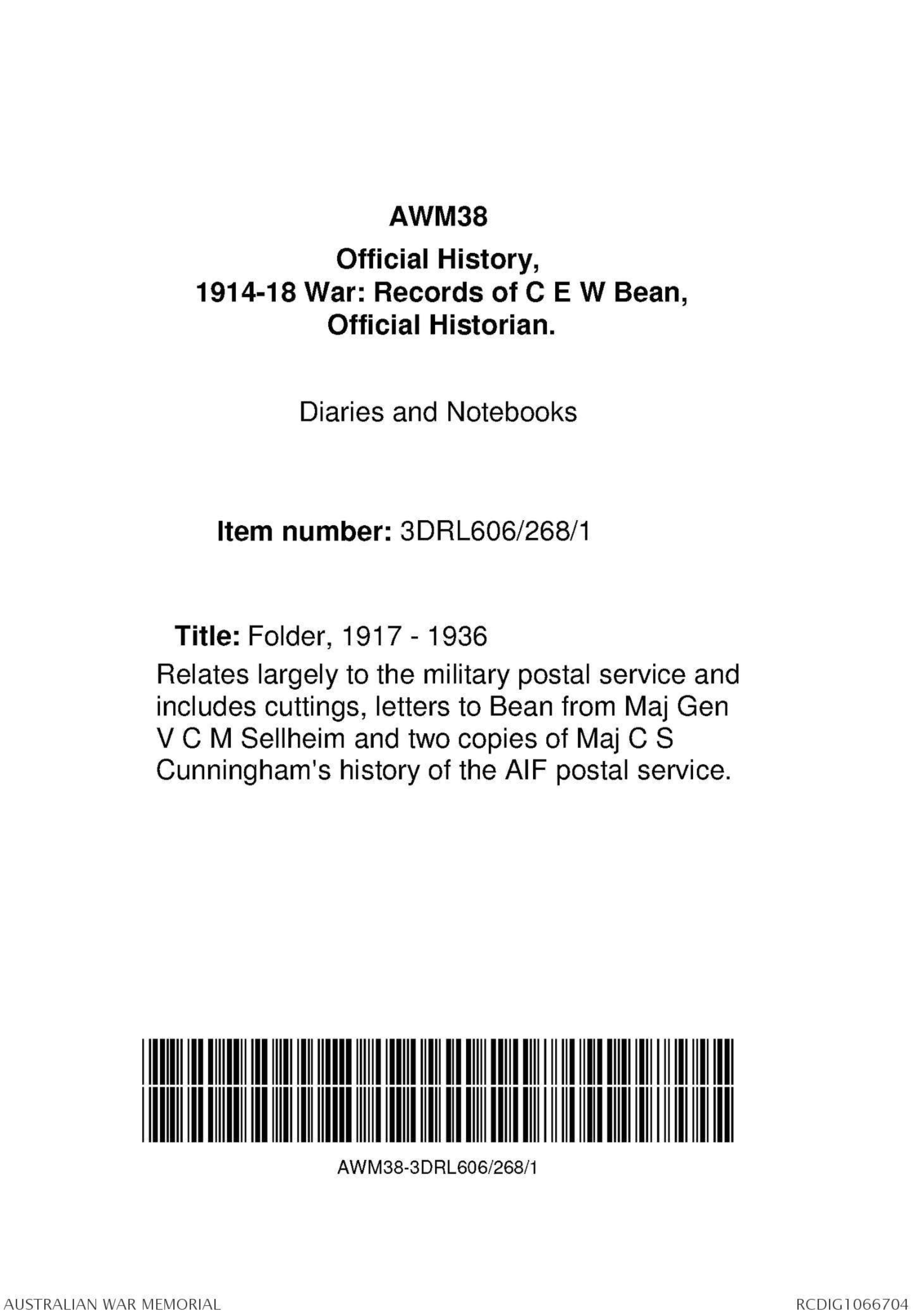
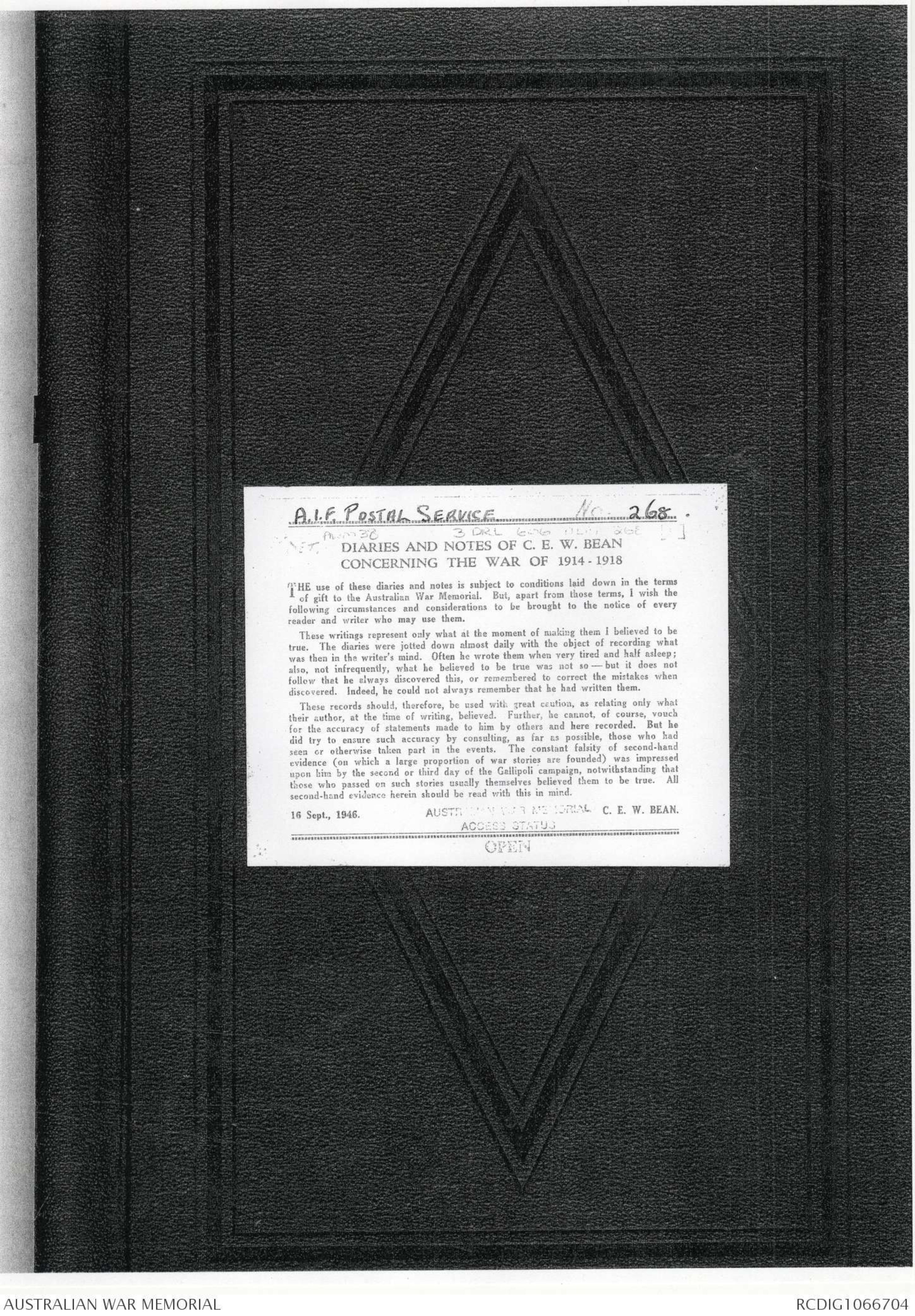
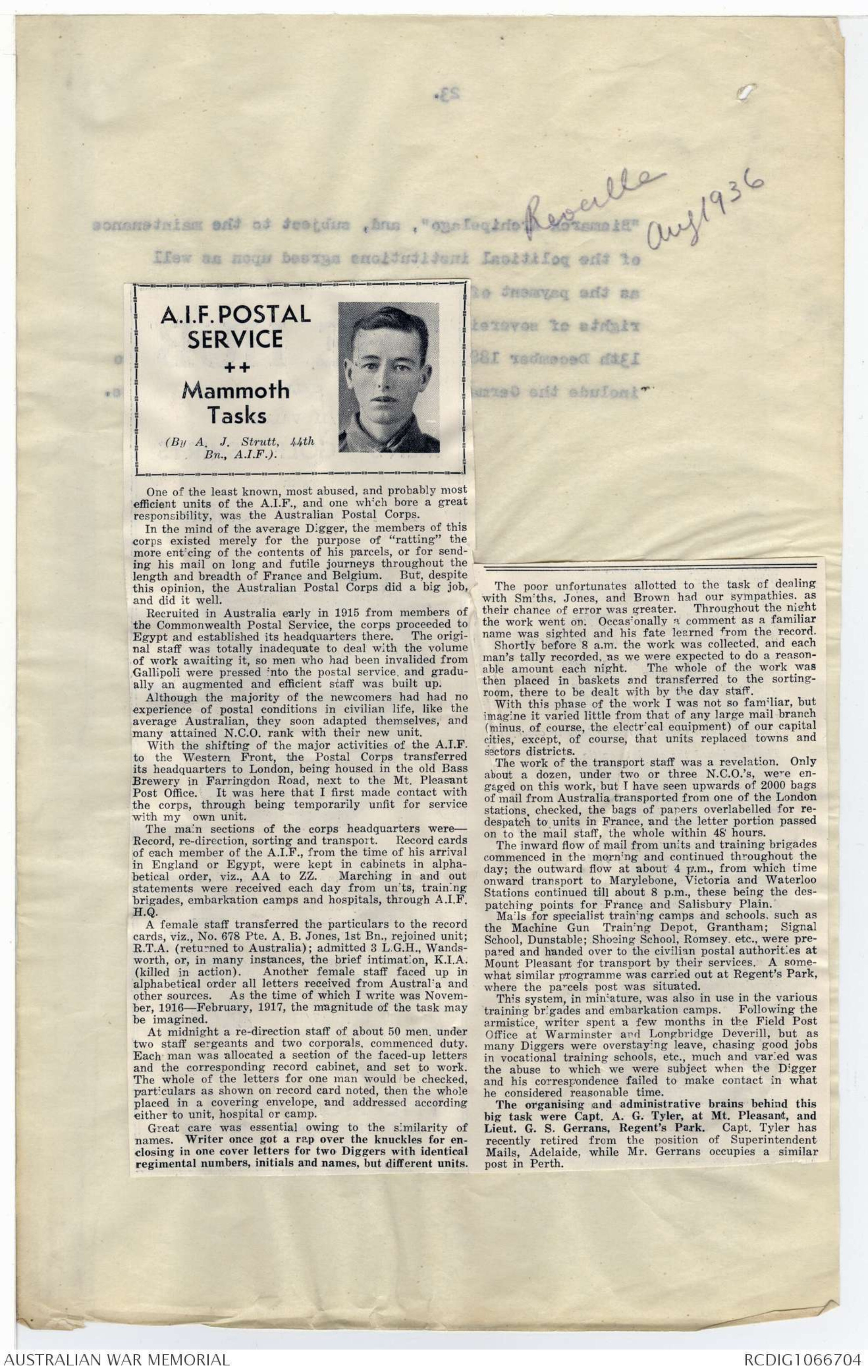
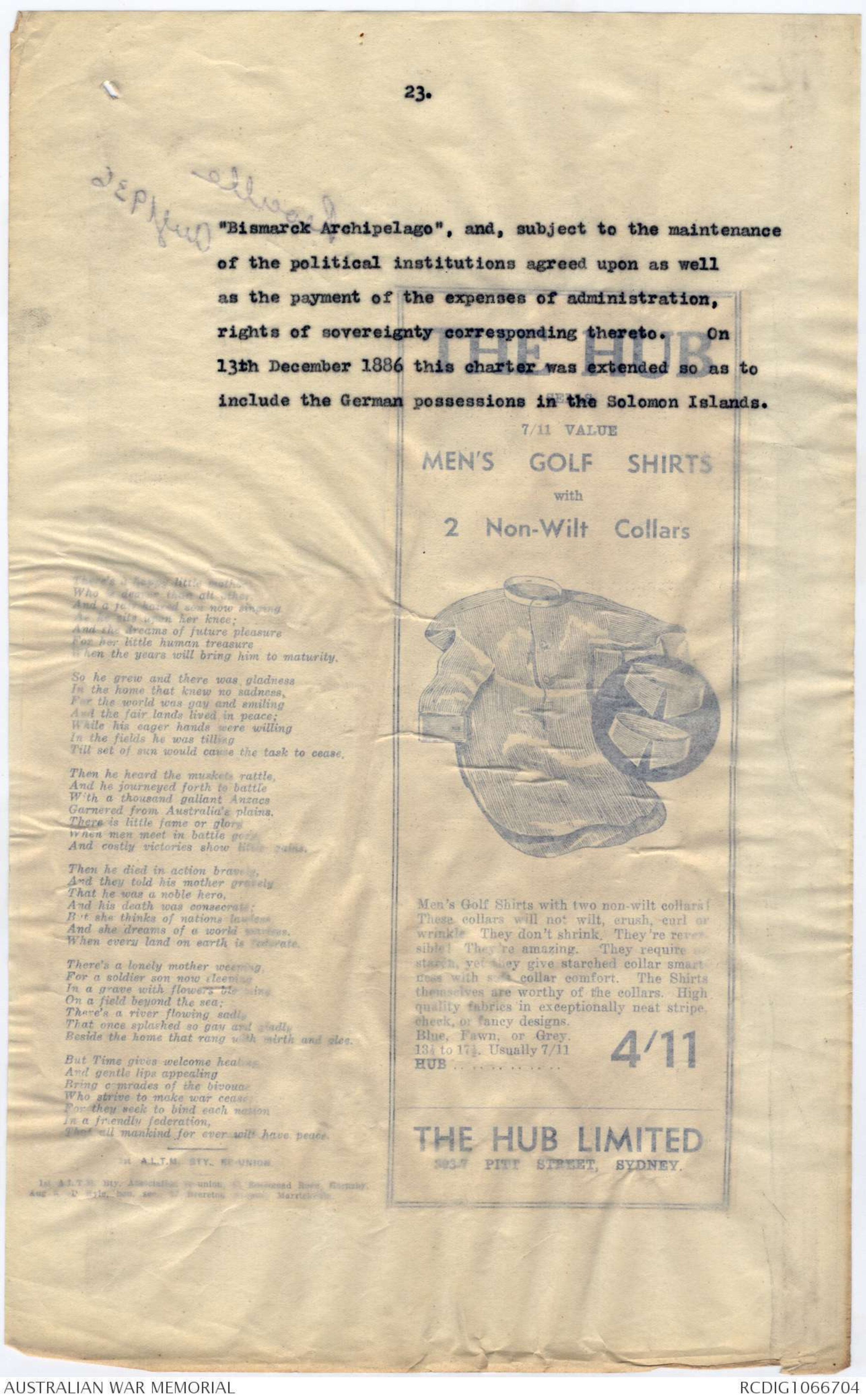
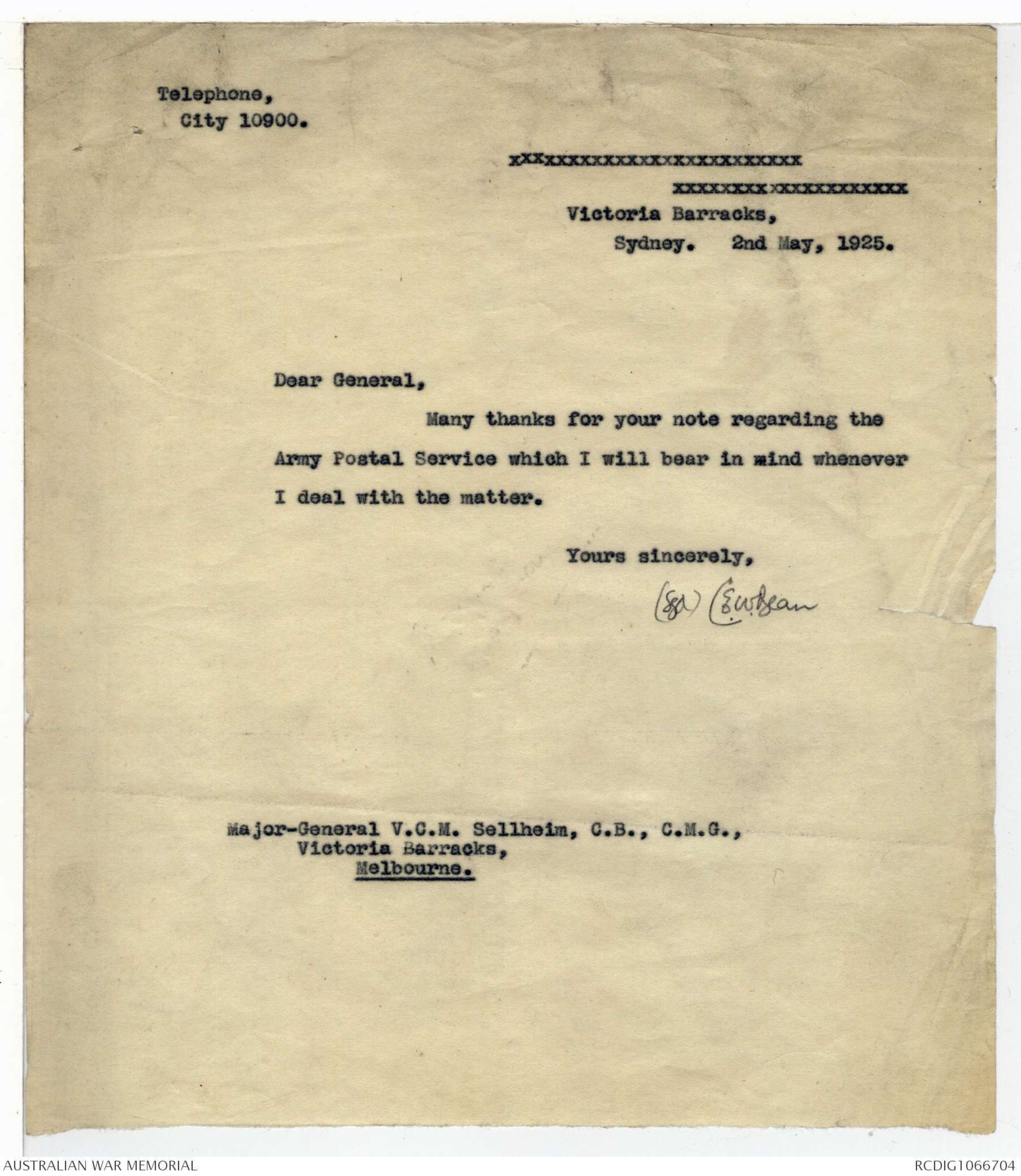
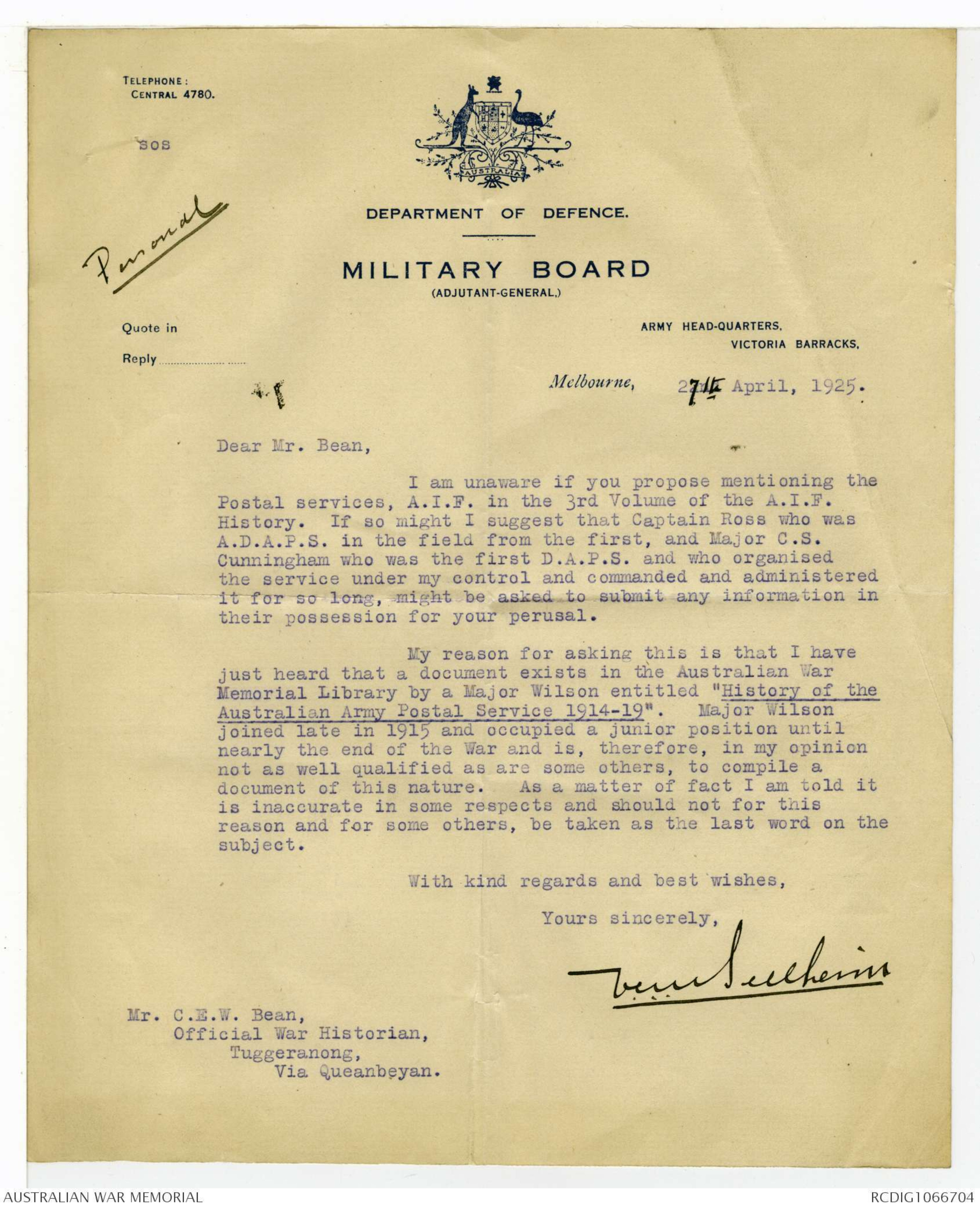
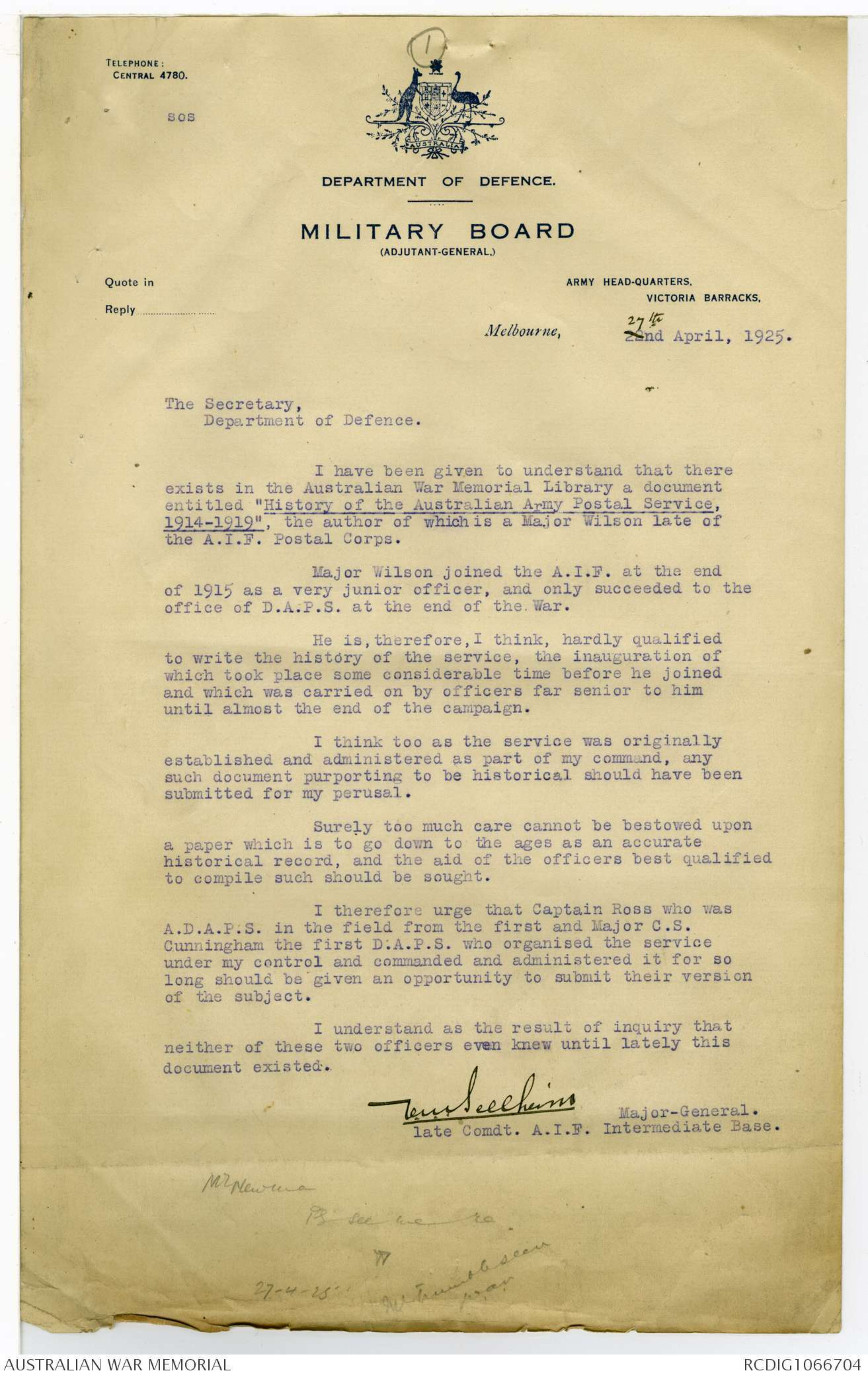
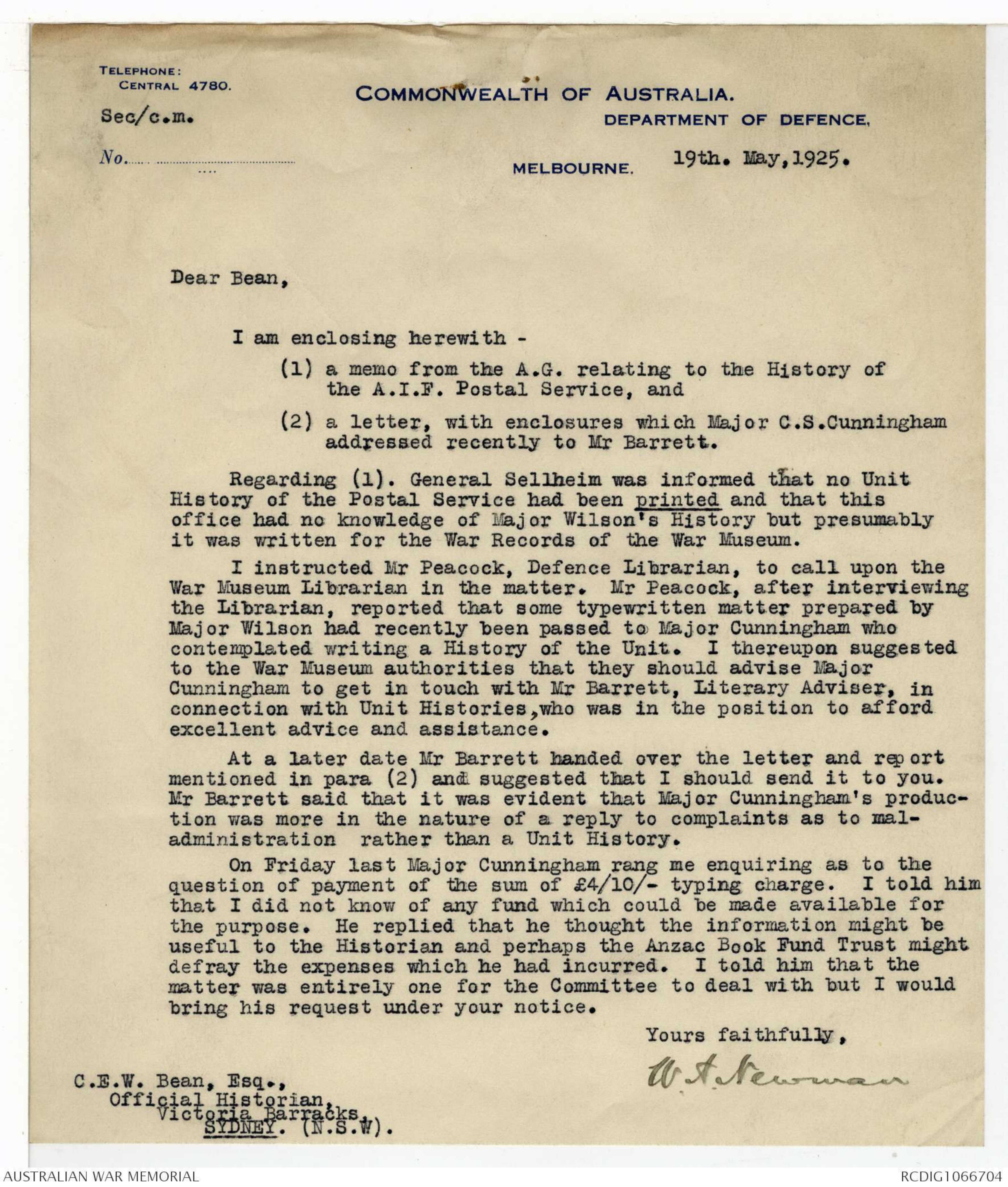
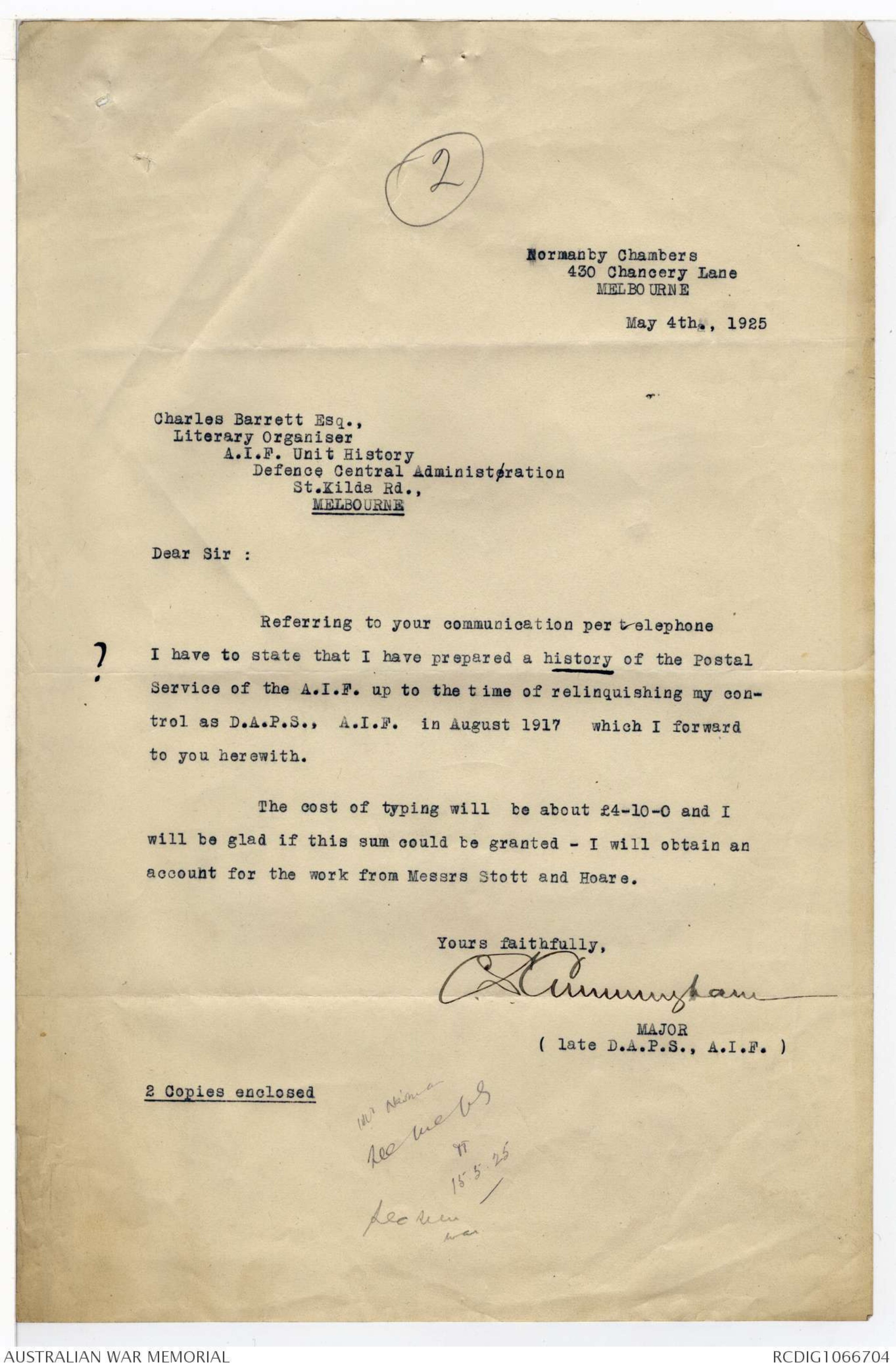
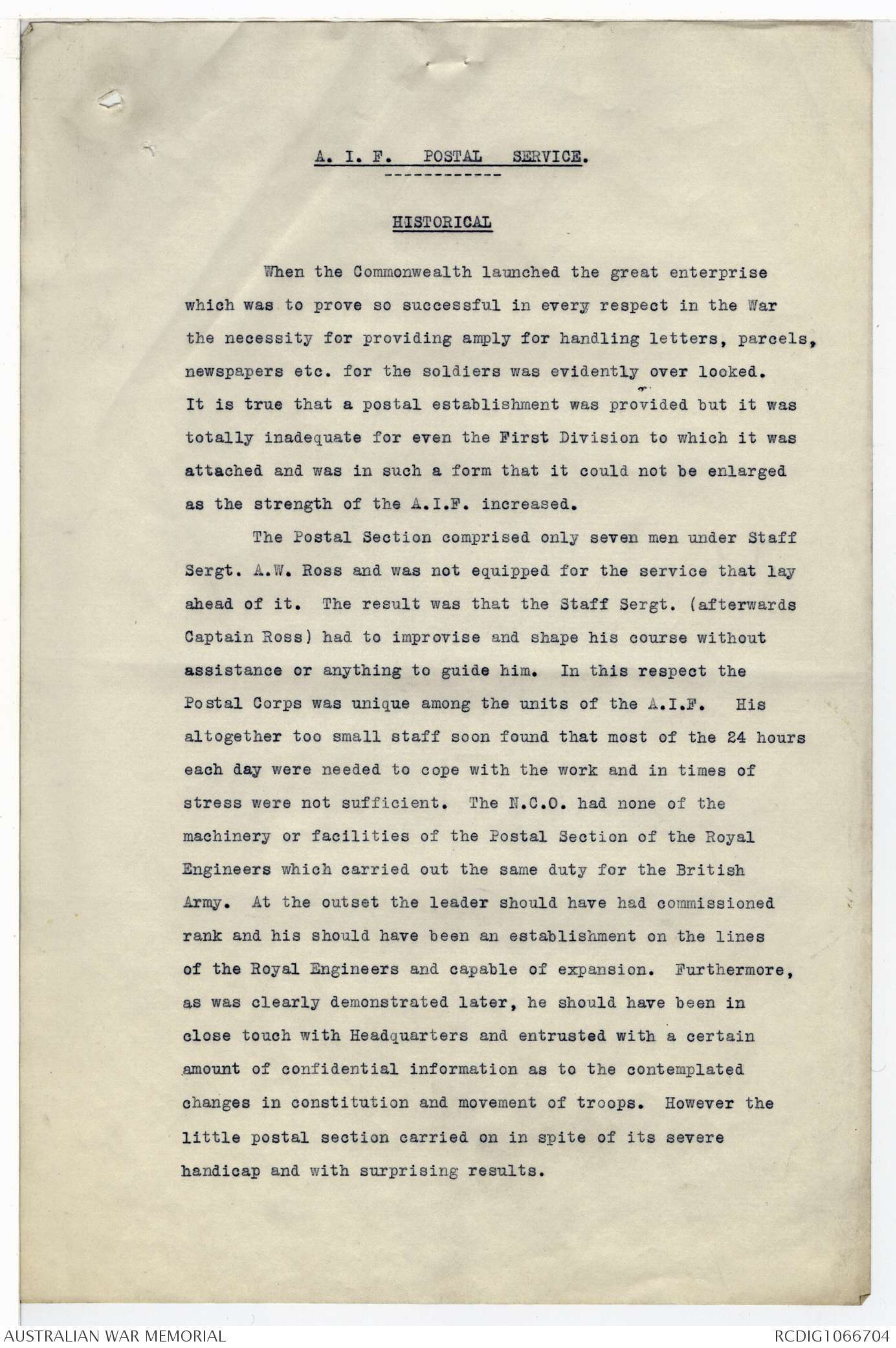
AWM38
Official History,
1914-18 War: Records of C E W Bean,
Official Historian.
Diaries and Notebooks
Item number: 3DRL606/268/1
Title: Folder, 1917 - 1936
Relates largely to the military postal service and
includes cuttings, letters to Bean from Maj Gen
V C M Sellheim and two copies of Maj C S
Cunningham's history of the AIF postal service.
AWM38-3DRL606/268/1
AUSTRALIAN WAR MEMORIAL RCDIG1066704
A.I.F POSTAL SERVICE No. 268
AWM38 3DRL 606 ITEM 268 [1]
NET. DIARIES AND NOTES OF C. E. W. BEAN
CONCERNING THE WAR OF 1914-1918
THE use of these diaries and notes is subject to conditions laid down in the terms
of gift to the Australian War Memorial. But, apart from those terms, I wish the
following circumstances and considerations to be brought to the notice of every
reader and writer who may use them.
These writings represent only what at the moment of making them I believed to be
true. The diaries were jotted down almost daily with the object of recording what
was then in the writer's mind. Often he wrote them when very tired and half asleep;
also, not infrequently, what he believed to be true was not so – but it does not
follow that he always discovered this, or remembered to correct the mistakes when
discovered. Indeed, he could not always remember that he had written them.
These records should, therefore, be used with great caution, as relating only what
their author, at the time of writing, believed. Further, he cannot, of course, vouch
for the accuracy of statements made to him by others and here recorded. But he
did try to ensure such accuracy by consulting, as far as possible, those who had
seen or otherwise taken part in the events. The constant falsity of second-hand
evidence (on which a large proportion of war stories are founded) was impressed
upon him by the second or third day of the Gallipoli campaign, notwithstanding that
those who passed on such stories usually themselves believed them to be true. All
second-hand evidence herein should be read with this in mind.
C. E. W. BEAN.
16 Sept., 1946.
AUSTRALIAN WAR MEMORIAL
ACCESS STATUS
OPEN
AUSTRALIAN WAR MEMORIAL RCDIG1066704
[*Reveille Aug 1936*]
A.I.F POSTAL SERVICE
++
Mammoth Tasks
(by A.J. Strutt, 44th
Bn., A.I.F.).
One of the least known, most abused, and probably most
efficient units of the A.I.F., and one which bore a great
responsibility, was the Australian Postal Corps.
In the mind of the average Digger, the members of this
corps existed merely for the purpose of "ratting" the
more enticing of the contents of his parcels, or for sending
his mail on long and futile journeys throughout the
length and breadth of France and Belgium. But, despite
this opinion, the Australian Postal Corps did a big job,
and did it well.
Recruited in Australia early in 1915 from members of
the Commonwealth Postal Service, the corps proceeded to
Egypt and established its headquarters there. The original
staff was totally inadequate to deal with the volume
of work awaiting it, so men who had been invalided from
Gallipoli were pressed into the postal service, and gradually
an augmented and efficient staff was built up.
Although the majority of the newcomers had had no
experience of postal conditions in civilian life, like the
average Australian, they soon adapted themselves, and
many attained N.C.O. rank with their new unit.
With the shifting of the major activities of the A.I.F.
to the Western Front, the Postal Corps transferred
its headquarters to London, being housed in the old Bass
Brewery in Farringdon Road, next to the Mt. Pleasant
Post Office. It was here that I first made contact with
the corps, through being temporarily unfit for service
with my own unit.
The main sections of the corps headquarters were -
Record, re-direction, sorting and transport. Record cards
of each member of the A.I.F., from the time of his arrival
in England or Egypt, were kept in cabinets in alphabetical
order, viz., AA to ZZ. Marching in and out
statements were received each day from units, training
brigades, embarkation camps and hospitals, through A.I.F.
H.Q.
A female staff transferred the particulars to the record
cards, viz., No. 678 Pte. A. B. Jones, 1st Bn., rejoined unit;
R.T.A. (returned to Australia); admitted 3 L.G.H., Wandsworth,
or, in many instances, the brief intimation, K.I.A.
(killed in action). Another female staff faced up in
alphabetical order all letters received from Australia and
other sources. As the time of which I write was November,
1916-February, 1917, the magnitude of the task may
be imagined.
At midnight a re-direction staff of about 50 men, under
two staff sergeants and two corporals, commenced duty.
Each man was allocated a section of the faced-up letters
and the corresponding record cabinet, and set to work.
The whole of the letters for one man would be checked,
particulars as shown on record card noted, then the whole
placed in a covering envelope, and addressed according
either to unit, hospital or camp.
Great care was essential owing to the similarity of
names. Writer once got a rap over the knuckles for enclosing
in one cover letters for two Diggers with identical
regimental numbers, initials and names, but different units.
The poor unfortunates allotted to the task of dealing
with Smiths, Jones, and Brown had our sympathies, as
their chance of error was greater. Throughout the night
the work went on. Occasionally a comment as a familiar
name was sighted and his fate learned from the record.
Shortly before 8 a.m. the work was collected, and each
man's tally recorded, as we were expected to do a reasonable
amount each night. The whole of the work was
then placed in baskets and transferred to the sorting-room,
there to be dealt with by the day staff.
With this phase of the work I was not so familiar, but
imagine it varied little from that of any large mail branch
(minus, of course, the electrical equipment) of our capital
cities, except, of course, that units replaced towns and
sectors districts.
The work of the transport staff was a revelation. Only
about a dozen, under two or three N.C.O.'s, were engaged
on this work, but I have seen upwards of 2000 bags
of mail from Australia transported from one of the London
stations, checked, the bags of papers overlabelled for re-despatch
to units in France, and the letter portion passed
on to the mail staff, the whole within 48 hours.
The inward flow of mail from units and training brigades
commenced in the morning and continued throughout the
day; the outward flow at about 4 p.m., from which time
onward transport to Marylebone, Victoria and Waterloo
Stations continued till about 8 p.m., these being the despatching
points for France and Salisbury Plain.
Mails for specialist training camps and schools, such as
the Machine Gun Training Depot, Grantham; Signal
School, Dunstable; Shoeing School, Romsey etc., were prepared
and handed over to the civilian postal authorities at
Mount Pleasant for transport by their services. A somewhat
similar programme was carried out at Regent's Park,
where the parcels post was situated.
This system, in miniature, was also in use in the various
training brigades and embarkation camps. Following the
armistice, writer spent a few months in the Field Post
Office at Warminster and Longbridge Deverill, but as
many Diggers were overstaying leave, chasing good jobs
in vocational training schools, etc., much and varied was
the abuse to which we were subject when the Digger
and his correspondence failed to make contact in what
he considered reasonable time.
The organising and administrative brains behind this
big task were Capt. A. G. Tyler, at Mt. Pleasant, and
Lieut. G. S. Gerrans, Regent's Park. Capt. Tyler has
recently retired from the position of Superintendent
Mails, Adelaide, while Mr. Gerrans occupies a similar
post in Perth.
23.
"Bismarck Archipelago", and, subject to the maintenance
of the political institutions agreed upon as well
as the payment of the expenses of administration,
rights of sovereignty corresponding thereto. On
13th December 1886 this charter was extended so as to
include the German possessions in the Solomon Islands.
There's a happy little mother,
Who is dearer than all other
And a fair haired son now singing,
As he sits upon her knee;
And she dreams of future pleasure
For her little human treasure
When the years will bring him to maturity.
So he grew and there was gladness
In the home that knew no sadness,
For the world was gay and smiling
And the fair lands lived in peace;
While his eager hands were willing
In the fields, he was tilling
Till set of sun would cause the task to cease.
Then he heard the muskets rattle,
And he journeyed forth to battle
With a thousand gallant Anzacs
Garnered from Australia's plains.
There is little fame or glory
When men meet in battle gory
And costly victories show little gains.
Then he died in action bravely,
And they told his mother gravely
That he was a noble hero,
And his death was consecrate;
But she thinks of nations lawless
And she dreams of a world warless
When every land on earth is federate.
There's a lonely mother weeping,
For a soldier son now sleeping,
In a grave with flowers blooming
On a field beyond the sea;
There's a river flowing sadly,
That once splashed so gay and gladly
Beside the home that rang with mirth and glee.
But Time gives welcome healing
And gentle lips appealing
Bring comrades of the bivouac
Who strive to make war cease
For they seek to bind each nation
In a friendly federation,
That all mankind for ever will have peace.
1st A.L.T.M. BTY. RE-UNION
1st A.L.T.M. Bty. Association re-union [[?]]
Aug [[?]] D Hyle, [[?]] 17 Brereton Avenue, Marrickville.
THE HUB
SELLS
7/11 VALUE
MEN'S GOLF SHIRTS
with
2 Non-Wilt Collars
Advertisement Sketch - see original document
Men's Golf Shirts with two non-wilt collars.
These collars will not wilt, crush curl or
wrinkle. They don't shrink. They're reversible.
They're amazing. They require no
starch, yet they give starched collar smartness
with soft collar comfort. The Shirts
themselves are worthy of the collars. High
quality fabrics in exceptionally neat stripe,
check, or fancy designs.
Blue, Fawn, or Grey.
13½ to 17½. Usually 7/11
HUB 4/11
THE HUB LIMITED
383-7 PITT STREET, SYDNEY
Telephone,
City 10900.
xxxxxxxxxxxxxxxxxxx
xxxxxxxxxxxxxxxxxxx
Victoria Barracks,
Sydney. 2nd May, 1925.
Dear General,
Many thanks for your note regarding the
Army Postal Service which I will bear in mind whenever
I deal with the matter.
Yours sincerely,
(Sgd) C E W Bean
Major-General V.C.M. Sellheim, C.B., C.M.G.,
Victoria Barracks,
Melbourne.
TELEPHONE:
CENTRAL 4780.
SOS
[*PERSONAL*]
Quote in
Reply
DEPARTMENT OF DEFENCE.
MILITARY BOARD
(ADJUTANT-GENERAL)
ARMY HEAD-QUARTERS,
VICTORIA BARRACKS,
Melbourne,
22nd7th April, 1925.
Dear Mr. Bean,
I am unaware if you propose mentioning the
Postal services, A.I.F. in the 3rd Volume of the A.I.F.
History. If so might I suggest that Captain Ross who was
A.D.A.P.S. in the field from the first, and Major C.S.
Cunningham who was the first D.A.P.S. and who organised
the service under my control and commanded and administered
it for so long, might be asked to submit any information in
their possession for your perusal.
My reason for asking this is that I have
just heard that a document exists in the Australian War
Memorial Library by a Major Wilson entitled "History of the
Australian Army Postal Service 1914-19". Major Wilson
joined late in 1915 and occupied a junior position until
nearly the end of the War and is, therefore, in my opinion
not as well qualified as are some others, to compile a
document of this nature. As a matter of fact I am told it
is inaccurate in some respects and should not for this
reason and for some others, be taken as the last word on the
subject.
With kind regards and best wishes,
Yours sincerely,
V C M Sellheim
Mr. C.E.W. Bean,
Official War Historian,
Tuggeranong,
Via Queanbeyan.
[*1*]
TELEPHONE:
CENTRAL 4780.
SOS
DEPARTMENT OF DEFENCE.
MILITARY BOARD
(ADJUTANT-GENERAL.)
ARMY HEAD-QUARTERS.
VICTORIA BARRACKS,
Quote in
Reply
Melbourne, 22nd 27th April, 1925.
The Secretary,
Department of Defence.
I have been given to understand that there
exists in the Australian War Memorial Library a document
entitled "History of the Australian Army Postal Service,
1914-1919", the author of which is a Major Wilson late of
the A.I.F. Postal Corps.
Major Wilson joined the A.I.F. at the end
of 1915 as a very junior officer, and only succeeded to the
office of D.A.P.S. at the end of the War.
He is, therefore, I think, hardly qualified
to write the history of the service, the inauguration of
which took place some considerable time before he joined
and which was carried on by officers far senior to him
until almost the end of the campaign.
I think too as the service was originally
established and administered as part of my command, any
such document purporting to be historical should have been
submitted for my perusal.
Surely too much care cannot be bestowed upon
a paper which is to go down to the ages as an accurate
historical record, and the aid of the officers best qualified
to compile such should be sought.
I therefore urge that Captain Ross who was
A.D.A.P.S. in the field from the first and Major C.S.
Cunningham the first D.A.P.S. who organised the service
under my control and commanded and administered it for so
long should be given an opportunity to submit their version
of the subject.
I understand as the result of inquiry that
neither of these two officers even knew until lately this
document existed.
V C M Sellheim
Major-General.
late Comdt. A.I.F. Intermediate Base.
[*Mr Newman
Pls see [[?]]
77
27-4-25 [[?]] *]
TELEPHONE:
CENTRAL 4780.
COMMONWEALTH OF AUSTRALIA.
Sec/c.m.
DEPARTMENT OF DEFENCE
No MELBOURNE. 19th. May,1925.
Dear Bean,
I am enclosing herewith -
(1) a memo from the A.G. relating to the History of
the A.I.F. Postal Service, and
(2) a letter, with enclosures which Major C.S.Cunningham
addressed recently to Mr Barrett.
Regarding (1). General Sellheim was informed that no Unit
History of the Postal Service had been printed and that this
office had no knowledge of Major Wilson's History but presumably
it was written for the War Records of the War Museum.
I instructed Mr Peacock, Defence Librarian, to call upon the
War Museum Librarian in the matter. Mr Peacock, after interviewing
the Librarian, reported that some typewritten matter prepared by
Major Wilson had recently been passed to Major Cunningham who
contemplated writing a History of the Unit. I thereupon suggested
to the War Museum authorities that they should advise Major
Cunningham to get in touch with Mr Barrett, Literary Adviser, in
connection with Unit Histories, who was in the position to afford
excellent advice and assistance.
At a later date Mr Barrett handed over the letter and report
mentioned in para (2) and suggested that I should send it to you.
Mr Barrett said that it was evident that Major Cunningham's production
was more in the nature of a reply to complaints as to mal-administration
rather than a Unit History.
On Friday last Major Cunningham rang me enquiring as to the
question of payment of the sum of £4/10/- typing charge. I told him
that I did not know of any fund which could be made available for
the purpose. He replied that he thought the information might be
useful to the Historian and perhaps the Anzac Book Fund Trust might
defray the expenses which he had incurred. I told him that the
matter was entirely one for the Committee to deal with but I would
bring his request under your notice.
Yours faithfully,
W. A. Newman
C. E. W. Bean, Esq.,
Official Historian,
Victoria Barracks,
SYDNEY. (N.S.W).
[*2*]
Normanby Chambers
430 Chancery Lane
MELBOURNE
May 4th., 1925
Charles Barrett Esq.,
Literary Organiser
A.I.F. Unit History
Defence Central Administeration
St.Kilda Rd.,
MELBOURNE
Dear Sir:
Referring to your communication per telephone
[*?*] I have to state that I have prepared a history of the Postal
Service of the A.I.F. up to the time of relinquishing my control
as D.A.P.S., A.I.F. in August 1917 which I forward
to you herewith.
The cost of typing will be about £4-10-0 and I
will be glad if this sum could be granted - I will obtain an
account for the work from Messrs Stott and Hoare.
Yours faithfully,
C S Cunningham
MAJOR
(late D.A.P.S., A.I.F.)
2 Copies enclosed
[*Mr Newman
See me CS
in
15.5.25
[[??]]*]
A. I. F. POSTAL SERVICE.
HISTORICAL
When the Commonwealth launched the great enterprise
which was to prove so successful in every respect in the War
the necessity for providing amply for handling letters, parcels,
newspapers etc. for the soldiers was evidently over looked.
It is true that a postal establishment was provided but it was
totally inadequate for even the First Division to which it was
attached and was in such a form that it could not be enlarged
as the strength of the A.I.F. increased.
The Postal Section comprised only seven men under Staff
Sergt. A.W. Ross and was not equipped for the service that lay
ahead of it. The result was that the Staff Sergt. (afterwards
Captain Ross) had to improvise and shape his course without
assistance or anything to guide him. In this respect the
Postal Corps was unique among the units of the A.I.F. His
altogether too small staff soon found that most of the 24 hours
each day were needed to cope with the work and in times of
stress were not sufficient. The N.C.O. had none of the
machinery or facilities of the Postal Section of the Royal
Engineers which carried out the same duty for the British
Army. At the outset the leader should have had commissioned
rank and his should have been an establishment on the lines
of the Royal Engineers and capable of expansion. Furthermore,
as was clearly demonstrated later, he should have been in
close touch with Headquarters and entrusted with a certain
amount of confidential information as to the contemplated
changes in constitution and movement of troops. However the
little postal section carried on in spite of its severe
handicap and with surprising results.
 Diane Ware
Diane WareThis transcription item is now locked to you for editing. To release the lock either Save your changes or Cancel.
This lock will be automatically released after 60 minutes of inactivity.